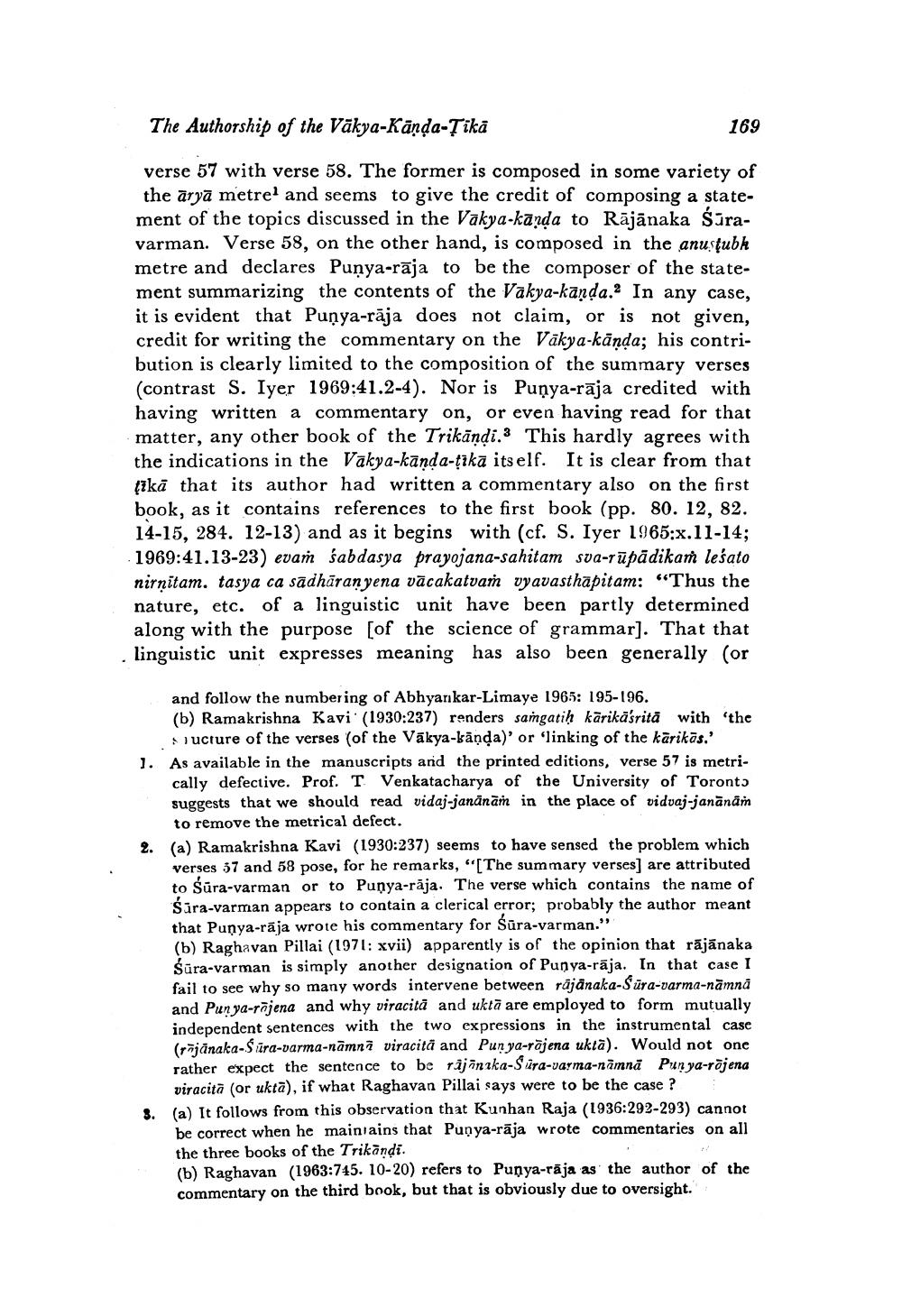Book Title: Authorship Of Vakya Kanda Tika Author(s): Ashok Aklujkar Publisher: Ashok Aklujkar View full book textPage 5
________________ The Authorship of the Vākya-Kānda-Țikā 169 verse 57 with verse 58. The former is composed in some variety of the āryā metred and seems to give the credit of composing a statement of the topics discussed in the Vakya-kānda to Rājānaka Suravarman. Verse 58, on the other hand, is composed in the anusţubh metre and declares Punya-rāja to be the composer of the statement summarizing the contents of the Vakya-kāņda.2 In any case, it is evident that Punya-rāja does not claim, or is not given, credit for writing the commentary on the Vākya-kānda; his contribution is clearly limited to the composition of the summary verses (contrast S. Iyer 1969:41.2-4). Nor is Punya-rāja credited with having written a commentary on, or even having read for that matter, any other book of the Trikāņdi.3 This hardly agrees with the indications in the Vakya-kānda-tika itself. It is clear from that çīkā that its author had written a commentary also on the first book, as it contains references to the first book (pp. 80. 12, 82. 14-15, 284. 12-13) and as it begins with (cf. S. Iyer 1965:x.11-14; 1969:41.13-23) evam sabdasya prayojana-sahitam sva-rūpādikan leśato nirnitam. tasya ca sadhāranyena vācakatvam vyavasthapitam: “Thus the nature, etc. of a linguistic unit have been partly determined along with the purpose [of the science of grammar]. That that linguistic unit expresses meaning has also been generally (or and follow the numbering of Abhyankar-Limaye 1965: 195-196. (b) Ramakrishna Kavi (1930:237) renders samgatih kārikā'sritā with the Iucture of the verses (of the Vākya-kānda)' or 'linking of the kārikās.' As available in the manuscripts and the printed editions, verse 57 is metrically defective. Prof. T Venkatacharya of the University of Toronto suggests that we should read vidaj-janānām in the place of vidvaj-janānā to remove the metrical defect. (a) Ramakrishna Kavi (1930:237) seems to have sensed the problem which verses 37 and 58 pose, for he remarks, "[The summary verses) are attributed to Sūra-varman or to Punya-rāja. The verse which contains the name of sara-varman appears to contain a clerical error; probably the author meant that Punya-rāja wrote his commentary for Śūra-varman." (b) Raghavan Pillai (1971: xvii) apparently is of the opinion that rājānaka Śūra-varman is simply another designation of Punya-rāja. In that case I fail to see why so many words intervene between räjänaka-Śūra-varma-nāmnā and Pun ya-rājena and why viracitā and uktā are employed to form mutually independent sentences with the two expressions in the instrumental case (rājānaka-Ślira-varma-nāmni viracită and Pun ya-rājena uktā). Would not one rather expect the sentence to be rijānuka-Sira-varma-nämnā Punya-rõjena viracita (or uktā), if what Raghavan Pillai says were to be the case ? (a) It follows from this observation that Kunhan Raja (1936:292-293) cannot be correct when he maintains that Punya-rāja wrote commentaries on all the three books of the Trikāndi. (b) Raghavan (1963:745. 10-20) refers to Punya-rāja as the author of the commentary on the third book, but that is obviously due to oversight.Page Navigation
1 ... 3 4 5 6 7 8 9 10 11 12 13 14 15 16 17 18 19 20 21 22 23 24
